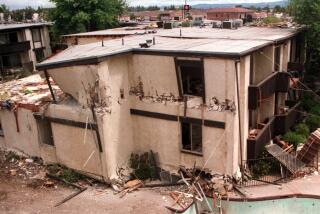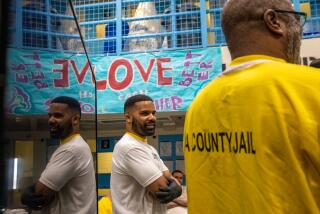Great Read: Army veteran’s guilt over surviving Iraq is a wound that won’t heal
It had been years since Sloan Sulham had heard from any of his men in Iraq.
But the soft voice and Philippine accent on the phone were immediately recognizable: Spc. Reyes.
“Arvin,” Reyes reminded his former platoon sergeant.
Sulham wasn’t likely to forget Arvin Reyes. They had been together on a day that changed both their lives.
In the early afternoon of June 28, 2007, they were riding in the same Humvee when insurgents in southern Baghdad ambushed their convoy. Five soldiers under Sulham’s command were killed.
Now, nearly seven years later, Reyes had tracked Sulham down in Florida to make a confession: One of the soldiers, his friend Spc. Shin Woo Kim, hadn’t died at the hands of the enemy.
Reyes said he had to tell the truth. He had accidentally shot Kim.
Sulham was astounded. He knew more than anyone else alive that Reyes was innocent.
He knew the Army had concluded Kim died from shrapnel from a grenade. He knew the autopsy report showed that Kim’s body had no bullet wounds. But most of all, he knew that Reyes didn’t even have a gun when Kim went down that day.
None of that seemed to matter to Reyes.
“Why didn’t you turn me in?” he asked Sulham.
Reyes believed that military authorities were covering up to the truth to protect him.
“They thought I was a good man,” Reyes, now 31, explained.
Sulham understood the wrenching guilt that soldiers often feel when they live and others die. It was one of the reasons he left the Army after the attack.
But a man clinging to responsibility for a killing he didn’t commit — it was as if he wanted to be punished for the accident of his own survival.
“He’s trapped in this,” said Sulham, now 41. “I keep telling him, you can’t keep beating yourself up over something you can’t change.”
But could he ever convince Reyes that his guilt was only in his mind?
::
From the turret of the second Humvee, Reyes had the best view of the street.
Sulham, a Vermont native, rode in the front, beside the driver, Sgt. Jesse Leonard from Ohio.
Kim, a 23-year-old medic who grew up in Fullerton, sat in back.
Their shift patrolling Baghdad’s Al Doura neighborhood was almost over when a massive bomb exploded under the lead vehicle and sent it flying. All four soldiers inside were killed instantly.
Reyes felt the sensation of heat rolling down his neck as he collapsed into the back seat. The next thing he remembers is Kim tapping on his helmet to stir him back to consciousness.
Sulham was already out of the truck and the disabled convoy was under attack when Kim appeared at his side.
A grenade landed between them.
Sulham dove over a courtyard wall as it exploded. When he stood up, he ran to Kim, who was face-down in the street. He dragged him to the wall and rolled him over. Kim’s eyes were closed, his nose dripped blood and his forehead was split open.
Reyes and Leonard — who had also been knocked out — arrived moments later.
“I don’t think Reyes was fully conscious when he got out of the truck,” Sulham recalled. “He was like sleepwalking.”
Only Leonard was carrying a rifle. Ordering him to tend to Kim, Sulham passed the gun to Reyes with instructions to shoot insurgents.
“Reyes was freaking out,” Sulham recalled. “I needed him to focus on his training instead of allowing himself to be paralyzed by fear.”
::
The soldiers who weren’t seriously wounded managed to get back to work in the next week or so.
For Reyes, however, the thought of returning to patrol made his heart race. He told Army doctors that he couldn’t stop thinking about suicide. They sent him back to Ft. Carson, in Colorado.
If somebody had to die, he felt it should have been him.
It’s a common feeling in people suffering from post-traumatic stress disorder: survivor’s guilt.
The phenomenon has been studied most in Holocaust survivors, many of whom spent the rest of their lives in its grip.
The guilt can be rational — lives could have been saved with the proper action — but usually it is a subconscious response to the whims of fate. It also can be seen as a form of mourning for the dead.
“To drop the guilt, to drop the grief, is to kill them a second time,” said Dr. Jonathan Shay, a psychiatrist and war trauma expert.
Family members said Reyes didn’t seem to care about much once he was honorably discharged in early 2008. He bought a house in Colorado but lost it to foreclosure. He gambled away his monthly disability pay in poker games and racked up credit card debt.
His marriage fell apart. He developed a daily marijuana habit.
“There’s something wrong with my brain since Iraq,” he told a nurse after admission to the psychiatric ward at the San Francisco Veterans Affairs Medical Center in early 2009, according to medical records he shared with The Times. “I keep feeling like I’m being followed all the time. And I have this guilt about leaving my friends.”
During a monthlong hospitalization, Reyes reported that voices were telling him to kill Pakistanis. He declared that he was 697 years old. At one point, he drew camouflage patterns on his face with a green marker.
In addition to PTSD, doctors came to suspect that he was suffering from schizophrenia or a related condition. Thought disorders tend to emerge in young adulthood. They are largely genetic, but that does not mean they are inevitable.
Sometimes it takes a trauma to unleash them.
Reyes spent the next several months in residential treatment for mental illness and substance abuse.
For a time, life improved. He met a woman online, Jocelyn Cruz, and moved back to the Philippines — where he had grown up — to be with her and spend time with a son he had from an old relationship. In 2012, he and Jocelyn moved to California and got married.
But Kim increasingly entered his thoughts.
Reyes confessed the killing to an uncle who had been in the Navy. He told Reyes that even if it were true, he had to put the war behind him. He had to forgive himself.
::
Sulham also felt guilty for surviving.
He cared deeply for Kim and the others, and felt he had let them down. “I looked after them like they were my children,” he said.
On the day of the attack, Sulham underwent surgery to remove shrapnel from his arm, shoulder and leg. He flew back to the U.S. a few days later.
He had been in the Army 13 years and planned on getting to 20 for the retirement pension. Instead, he called it quits.
“I couldn’t put any more guys in the body bag,” he explained recently. “That was it.”
Sulham struggled at first and avoided fireworks, movies about the Middle East and other reminders of war. But he eventually managed to get on with his life. He retrained to be a commercial helicopter pilot and got married. The bad dreams subsided.
He put his faith in God and gave up trying to understand why he had lived when others died.
“Why wasn’t it me? All these questions you can’t answer. It’s not for you to answer.”
He urged Reyes to accept that.
But the weight of Kim’s death only grew heavier.
Last fall, after Reyes showed up at a San Francisco police station and tried to turn himself in for Kim’s murder, the VA admitted him to a psychiatric ward for three days. Medical records described him as guilt-ridden and delusional.
He found an old obituary for Kim online and posted a military portrait of himself, cleanshaven and 40 pounds lighter. Then he typed his name, address, phone number and a message for Kim’s family.
“I am sorry to tell you that I may have accidentally shot Sgt. Shin Woo Kim on the day we got ambushed in Iraq,” he wrote. “Forgive me.”
Reyes also called the Army Criminal Investigations Command, which launched a new inquiry.
“You cannot keep this moment alive and let it take over your life,” Sulham wrote to him in a text message in November. “You prayed to God to spare your life God answered your prayer. Put this bad day to rest. It has stolen seven years of your life God gave you.”
Reyes answered: “If I don’t do it who did it and where is he at. I couldn’t find it, and all I see is myself.”
::
Reyes’ family has started to lose hope that he will ever get better.
“I think he’s still in the war,” said his brother Antonio Jr., a health aide who shares a dank San Francisco apartment with Reyes and their 87-year-old father. “He’s so confused. He just can’t move on.”
Living off disability pay from the VA and Social Security, Reyes has asked Jocelyn for a divorce.
“Just sign the paper and find someone who will love you normally,” he wrote to her in a text message in October.
Reyes said an Army investigator has notified him that the new inquiry is over and that he is innocent.
“There’s no more investigation going on,” he said. “It’s just me thinking about it over and over again.”
Follow Alan Zarembo on Twitter at @AlanZarembo
More to Read
Start your day right
Sign up for Essential California for news, features and recommendations from the L.A. Times and beyond in your inbox six days a week.
You may occasionally receive promotional content from the Los Angeles Times.







